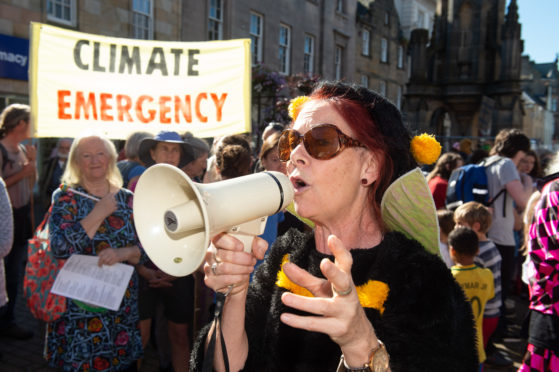We seem continually reminded these days of the crisis relating to global warming. Switch on the television and we see daily news reports on the growing protests from groups such as Extinction Rebellion and Fridays for Future.
I experienced this indirectly recently on a “staycation” to Glasgow where I had decided to leave the car and navigate the city on foot to avoid the congestion created by some of the protests. This had an unexpected positive impact as I discovered hidden gems of the city on foot that I wouldn’t have otherwise had I been in the car.
I spent some of my time in Glasgow with my student daughter, frequenting old haunts and I was reminded of my own time as a student and one who actively protested.
Embracing the historical culture of activism that comes with being a student seems to me a rite of passage; the belief in the power to change society and the need to make the world a better and fairer place. The current protests however are made up not only of students but school children, pensioners, parents with children, professionals taking time off work to participate in protest marches. Galvanised by the power of social media, they gather in their thousands demanding action.
I watch these protests attentively as someone with an interest in how business can play its part in saving our planet. Of course, the wider issue is not just about climate change, but also economic inclusivity, human rights, labour rights and anti-corruption. The United Nations (UN) says that change must be led by business because business has the most impact on society and can change the way we as consumers behave; the way we buy and consume things. Therefore, they assert, business is the one that must lead the way. In support of this, nearly 20 years ago, the UN created the UN Global Compact, a platform for businesses to help the UN deliver seventeen global sustainable development goals (SDGs). These goals include gender equality, affordable and clean energy, decent work and economic growth, reduced inequalities, industry, innovation and infrastructure, no poverty, good health and well-being, climate action, sustainable cities and communities, responsible consumption and production, peace and justice strong institutions, life on land, life below water, zero hunger, partnerships for the goals and quality education.
UN Secretary General António Guterres challenges businesses to be the innovators in delivering a fairer and more sustainable global society. And yet, at the SDG business forum in New York last September, it was widely acknowledged that there is a long way to go – an assertion that seems to be mirrored by the views of protesters the world over.
It is of interest to me as a researcher and teacher of responsible leadership and management that businesses, in my experience, want to behave responsibly. But as recent (2018) statistics reported by the UN Global Compact suggest, although business is beginning to rise to the challenge, many struggle to do so. Behaving responsibly is a complex business, as anyone would find embarking on this subject. How can we harmonise economic growth and business performance with social responsibility and the protection of our natural environment?
The UN puts responsible leadership and management practices right at the top of its agenda and promotes responsible management education in line with this, but what does it mean to behave responsibly? This seems like a straightforward question, but looking at what is written on the subject and variety of topics related to the SDGs, it really isn’t. What is ethical and responsible to me, might mean something else to you. What is acceptable to me in business might not be for someone else.
What is clear, as writer and management theorist R Edward Freeman suggested in 1984, is that business relies on society and it therefore must take a responsible approach to it if it is to remain sustainable. That means considering the needs of all stakeholders and acting responsibly towards them as we do business. It means thinking ahead and planning strategies through a responsible lens so that we manage ethically. It means to innovate but consider the needs of society as we do so.
That takes a truly innovative and entrepreneurial mindset. This year, the University of the Highlands and Islands has developed a new MBA with four pillars underpinning the course: applying ethical awareness, incorporating cultural awareness, developing future readiness and identifying growth and opportunity. These are also at the heart of a new fully accredited continuing professional development course for business managers in responsible leadership and management for contemporary business. The course has been developed in partnership with an international organisation which recognises the importance of taking a responsible and innovative approach to its leadership, demonstrated in its desire to do this with its local university. I am thrilled to be leading the course programme. It is an ideal opportunity to use cutting-edge research to create impact on how businesses operate and perform, and the company involved is right behind it. In many ways it mirrors what is going on in our society and shows a real desire to make a difference in our community, which is what this university’s vision is all about.
Allane Hay is deputy head of academic partnerships and programme leader in business and management at Moray College, University of the Highlands and Islands
